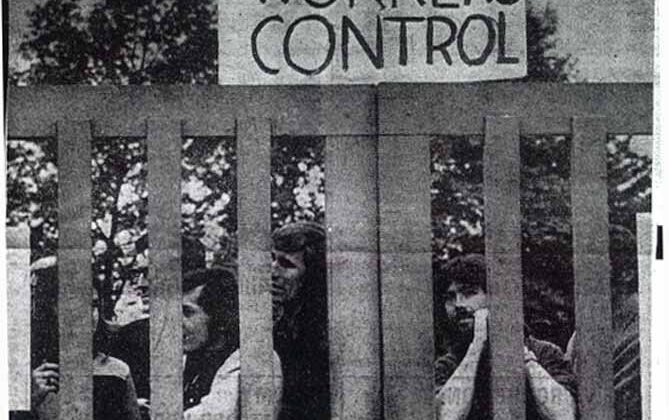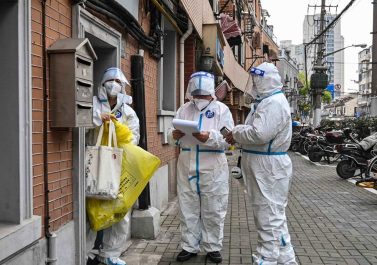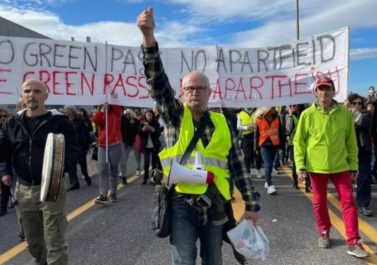While many on the left waited around and asked the government to tell them what to do, many workers around the globe have taken limited, but real steps towards workers’ control. Spontaneous strikes have spread from car factories in Italy to Canada and the US; a series of call centre strikes erupted in Brazil; Amazon workers in Spain and France and New York walked out; public cleaners and mining workers are on strike in Peru; garment workers in Bangalore refuse to enter the factories without protective gear.
We can already see a politicisation within this short and global movement of the class.
The most immediate demands of workers on strike were to receive the right protection gear against Covid-19. But then many strikes went further than this, for example in the case of AvioAreo in Italy workers questioned whether their work – the production of aeroplane engines – is socially essential in these times. Workers at Ferrari did the same for obvious reasons. The fact that we haven’t seen many similar actions in the UK might also have something to do with the general focus on the state and parliamentary solutions. This focus on the Labour Party came in the way of workers’ control in the past, for example during the Lucas Plan dispute. [1]
These are the first fundamental steps and real material experiences of workers’ control. From this point there is no even and gradual path towards the expansion of this control – it will depend on the struggle of workers. But we, as working class revolutionaries, can at least do a few things to support this development:
1. Keep on documenting and systematising the reports of working class struggles in this situation.
2. Share reports about how the discussions and experiences change within the world of work today. If we look at the work of some of our comrades, who are supermarket delivery drivers, we can see certain tendencies: If you are at risk with each delivery, you and your colleagues will start to question whether it makes more sense to deliver sushi rolls to City offices or fresh vegetables to the elderly care home. Once this question arises, the position of management is called into question: management is primarily there to enforce work for business, whether it is useful or not.
3. Share reports about steps workers’ are taking to change the nature of their service or product in order to make it more socially useful. Some of this might happen under ‘government decree’, but in the end it will be the engineering and shop-floor workers who will materially change the production process, for example from car parts to respirators. Here the divisions between intellectual and manual labour will be questioned and re-drawn and the possibility of more equal relationships at work will emerge.
4. Help push for equality. The question of equality has already been raised: why should waged workers get better financial government support than their self-employed colleagues. Why can already ‘privileged’ white-collar workers work from home, while others have to stand in warehouse or factory halls? This question of equality will organically expand over time: how can the workload in the essential industries be shared out more equally? How can we avoid 12-hour shifts for some, while others (have to) sit at home?
5. Support connections beyond the workplace. The limits of workers’ control on the level of an individual workplace are already visible. Most workplaces, in particular in food and other manufacturing depend on sophisticated (international) supply chains [2] Even in order to keep basic production running, connections between productive units have to be re-forged. The longer the Corona crisis will last, the more the financial links between productive units will come under strain. The liquidity and debt problems of one company might endanger the production in a whole sector. A drastic drop in the value of a national currency and exchange rate might endanger supply. Here we will see that the ‘critique of money and the commodity form’ is not an intellectual exercise, but a material necessity.
6. Beware of the state! A left that demands ‘stricter enforcement of social distancing’ from the state is an enemy of the working class, full stop. The capitalist state is not ‘ambivalent’, the ‘struggle over hegemony’ is a cop out, fuck Gramsci and his disciples! In Portugal the ‘left government’ has suspended the right to strike. In France, management uses the police to threaten postal workers who refuse to risk their lives due to bad health and safety. In Italy the state wants to keep production running and it is workers’ actions that enforce protective measures, such as not standing close to each other on an assembly line producing bullshit.
In the current moment we can see the deficiencies of a radical left that has ignored the working class over the last decades. We can see the limits of the ‘communisation’ and ‘insurrectionist’ ultra-left: what impact would a mass wave of looting and rioting actually have in the current social atmosphere? Redistribution of wealth and self-defence towards the state has no basis if it is not backed up by a cohesive and disciplined force of workers in the essential industries who can guarantee social survival.
The radical left doesn’t have the sufficient roots within the working class in order to practically push towards an expansion of workers’ control. Furthermore, there is no political organisation of the working class that can combine the knowledge and power of both ‘science workers’ and ‘shop-floor workers’ within a socially emancipatory trajectory. We need to build that organisation. We see our new book as a modest contribution towards this process, the introduction can be read here: www.classpower.net/intro



